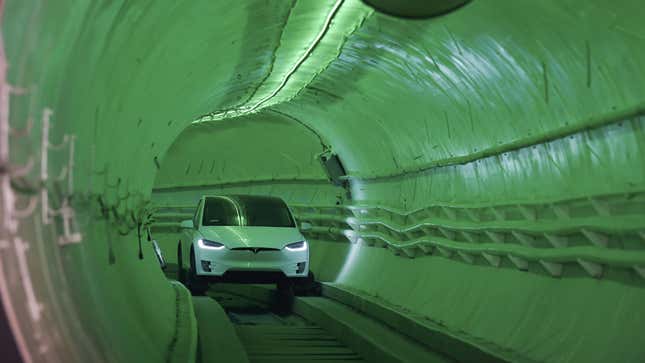
Poor performance and even poorer public perception have forced Elon Musk’s Boring Company to largely pivot away from its most ambitious projects and opt instead to prioritize more politically friendly locals. Now, Musk reportedly has his sights set on Texas and Miami for the company’s near future.
Boring has reportedly filed for permits to develop a new test site and compound in Bastrop Country near Austin, according to 2021 documents obtained by Bloomberg Businessweek. The company reportedly plans to build a compound on the land equipped with on-site housing where they will build “as many tunnels as necessary” to test out new techniques for developing underground tubes. Each of the tunnels at the test site may stretch around 300-600 feet long.
Besides the tunnels, Boring’s Texas site will reportedly feature 10 prefabricated, 550 square feet one-bedroom homes for workers, and may one day include a cafe and retail buildings.
Meanwhile, about 1,300 miles to the east, the company also recently submitted a proposal for a new 6.2-mile loop tunnel in Miami. That proposal, Insider reports, claims the so-called “The North Miami Beach Loop” could potentially transport more than 7,500 passengers per hour. At scale, Boring believes that figure could jump up to 15,000 per hour, though if Boring’s recent displays are any guide that’s still a long, long way away.
Boring estimates its proposed Miami project would cost between $185 million to $220 million and could take less than three years to build. The company also outlines ways it could expand upon the 6.2-mile route, potentially adding connections to Hard Rock Stadium and Florida International University’s Biscayne Campus. As with all Musk-related ventures, these timelines and estimates should be taken with a grain of salt.
Still, the proposals were met with excitement from at least some Florida officials.
“We have a lot of traffic congestion and this would be a way of alleviating a great deal of that traffic,” North Miami Beach Commissioner Michael Joseph told Insider. Joseph claims Musk’s tunnels could come at a fraction of the cost of larger infrastructure plans and could potentially get started with comparatively few major disruptions to the local economy.
The Miami proposal marks the second attempt by Boring to cave out the ground beneath Florida in as many years. Last summer, the Fort Lauderdale mayor said the city had accepted a proposal to build a tunnel connecting the city down toward the beach, something he saw as a “truly innovative way to reduce traffic congestion.”
Both of these new projects follow a slew of reported pitfalls and strategic re-orientation at the company. Though Boring once had grand, years-long plans to build tunnels connecting Washington and Baltimore and another meant to shuttle Los Angeles residents to Dodger stadium, both of those endeavors stalled due to regulatory restrictions and environmental review, Bloomberg notes. In a sign of exasperation, the company reportedly removed any mention of the projects from its website.
“I think you can declare these dead,” Dena Belzer, President of Consultancy Strategic Economics, told Bloomberg at the time.
Other still active projects on the other hand have failed to whip up the levels of hype attained by Musk’s other side hustles. In Las Vegas, for example, where Boring currently operates a tunnel transporting drivers to the Las Vegas Convention Center, cars can still only attain a top speed of around 35mph and have to drive one at a time. Videos posted of commuters using the tunnel so far appear half-assed at best.
From a purely practical perspective though, Boring’s geographic reorientation makes sense, particularly in Texas. Tesla, for instance, officially moved its headquarters from Palo Alto to Austin last year, as did Musk himself. Both Texas and Austin also saw some of the largest influx of tech workers migrating during the pandemic as well, though there are signs some of that shakeup is at least partially leveling out.
Metro areas in Texas and Florida, which largely lack subways and other forms of public transportation, do legitimately need some major reimagining of their transportation infrastructure. Whether or not Boring so far lackluster tubes can actually make any meaningful difference in that department, though, is another thing entirely.